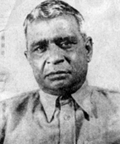Datta, Dhirendranath

Datta, Dhirendranath (1886-1971) lawyer, social worker and political leader. Born on 2 November 1886 corresponding to 16 Kartick 1293 BS at Ramrail, three miles north of Brahmanbaria town, Datta was the son of Jagabandhu Datta, a serestadar in the Munsif Court. He passed the Entrance Examination from Nabinagar High School in 1904, graduated from the Calcutta Ripon College in 1908 and obtained BL Degree from the same institution in 1910.
Dhirendranath Datta served as the Assistant Headmaster of the Bangura Umalochan High English School, Muradnagar, Comilla for about a year and then joined the Comilla District Bar in 1911. He was elected the Secretary of’ the ‘Tripura Hitasadhani Sabha’ in 1907 and took part in the relief works during the devastating floods of 1915. In pursuance of the ideals of’ MK Gandhi he established ‘the Mukti Sanggha’, a social welfare organisation. He was associated with the activities of the ‘Abhay Ashram’ of Comilla and was elected a member of the Comilla District Board in 1936. During the famine, 1943 Dhirendranath Datta took active part in relief works.
Being inspired by surendranath banerjea and Barrister abdur rasul, Dhirendranath Datta joined the movement for the annulment of the partition of bengal, 1905. In 1919, Datta participated in the Mymensingh Provincial Congress conference. He gave up his legal profession for three months at the call of chitta ranjan das and participated in the non-cooperation movement. He was elected a member of the Bengal Legislative Council in 1937 and was associated with the amendments of the Bengal Tenancy Act, passing of the Bengal Agricultural Debtors' Act and Bengal Money Lenders' Act. He participated in the quit india movement (1942). For his anti-British activities he was arrested several times and suffered simple and rigorous imprisonment at different jails. Dhirendranath was elected a member of the Bengal Legislative Council on Congress ticket in 1946 and in December of that year he was elected to the Pakistan Constituent Assembly from East Bengal to frame the constitution of Pakistan.
After 1947, Dhirendranath Datta participated in the politics of Pakistan as a non-communal politician. In the Pakistan Constituent Assembly session held on 25 August 1948, Datta demanded the use of Bangla along with English and Urdu for conducting its proceedings. In the session of the Constituent Assembly held in June 1954 Datta moved an adjournment motion against the promulgation of Governor's Rule in East Pakistan. He was the Minister of Health and Social Welfare of East Pakistan from 19 September 1956 to 7 October 1958 in the cabinet led by ataur rahman khan.
After the promulgation of Martial Law (1958), Dhirendranath was served with an Elective Bodies Disqualification Order (EBDO) in 1960. During the1965 Indo-Pak war he was put in house arrest and since then he refrained from taking part in active politics. Even then, as a believer in Bengali nationalism, he maintained intimate connection with prominent Bengali leaders.
Dhirendranath Datta, with his son Dilipkumar Datta, was arrested on the night of 29 March 1971, taken to Mainamati Cantonment and was tortured to death. The road in front of his Comilla house has been named after him. [Muhammad Abdus Salam]
